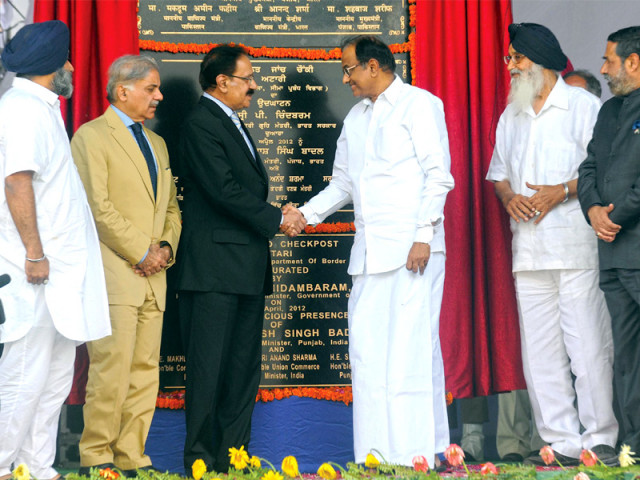Major strides: India opens door to more trade with Pakistan
Allows, in principle, FDI from Pakistan; inaugurates second border check post at Attari.

India, quite literally, opened the door to more trade with Pakistan on Friday.
The country not only allowed, in principle, foreign direct investment (FDI) from Pakistan but also inaugurated a second integrated check post (ICP) on the border at Attari.
“As part of the initiatives to promote trade, India has in principle agreed to allow FDI from Pakistan,” Commerce and Industry Minister Anand Sharma said after a meeting with visiting Pakistani Commerce Minister Makhdoom Amin Fahim.
Sharma said the procedures and necessary requirements for allowing investments from Pakistan were in the formulation stage and would be notified soon.
The process, however, is expected to be far from swift since it is not just a negotiation between the neighbouring countries but also among various ministries within India. India, for example, badly needs an injection of foreign investment in civil aviation, but experts say the chances of allowing Pakistani FDI in civil aviation were slim.
In addition, both countries have also agreed in principle to allow the opening of each other’s bank branches in their territories to facilitate financial transactions and ensure smooth trade.
The Reserve Bank of India (RBI) and the State Bank of Pakistan (SBP) have held several rounds of talks in this regard and a very positive situation has emerged.
“Both RBI and SBP are in favour of opening up of branches on both sides of the border,” Sharma said. This was endorsed by Fahim who said that both sides were on the same page on this issue.
Sharma added that following the proactive steps taken by Pakistan, India would also carry out a review of the ‘sensitive trade list’ during the next few months as a confidence-building measure. He also announced that an India-Pakistan Business Council will be set up soon.
Fahim said that talks were under way between the two countries on exploring opportunities of textile trade.
“We have also decided to open up negotiations in the hospitality, education and tourism sectors and experts would be constituted to work out the modalities for talks,” he said.
Second border post
The political and business leadership of Pakistan and India gathered at the Indian side of the border at Attari, near Amritsar, to inaugurate a second Integrated Check Post (ICP).
The new post would pave way for smooth flow of road traffic, provide upgraded and modern infrastructure for traders from both countries, and facilitate the people crossing the border.
Indian Home Minister P Chidambaram, Indian Punjab Chief Minister Parkash Singh Badal and his Pakistani counterpart Shahbaz Sharif accompanied Sharma and Fahim in unveiling the plaque.
Inaugurating the check post, the leaders pledged to remove all artificial barriers to trade.
The Indian Punjab chief minister called upon Pakistan to extend its approved list of 137 items traded from Wagah-Attari land route, and bring it at par with the 6,000 items being traded at present through the Mumbai- Karachi sea route.
Badal also urged the governments to extend the rail tracks to the newly-established ICP to further boost trade.
He asked the two countries to relax visa regimes, at least for the elected representatives and pilgrims visiting shrines. He also urged Pakistan to allow transit of goods to Afghanistan.
The Indian home minister endorsed Badal’s demands and said the new post at Attari is the first of 13 ICPs India will construct on the border with Pakistan, Bangladesh and Nepal.
Chidambaram termed the opening a gateway of trade and prosperity to Central Asian countries that is bound to increase Indo-Pak trade four folds.
He added that both countries are endeavouring for visa-free travel for which a joint working group has been formed.
Shahbaz Sharif cited the example of European Union and said that if western Europe can have a single currency after decades of enmity, why is it impossible for India and Pakistan.
Instead of fighting with one another, India and Pakistan must launch a war on poverty, and work towards economic integration, trade innovation and collective power generation, he said.
Instead of importing goods from Mumbai to Karachi via Dubai or Singapore, why can they not be traded through Attari, Shahbaz added.
Collaboration on education
The two countries did not stop just at trade though.
The Hyderabad-based Indian School of Business (ISB) signed a memorandum of understanding (MoU) with the Karachi-based Institute of Business Administration (IBA) to provide executive education in Pakistan.
Under the MoU, signed by ISB Deputy Dean Deepak Chandra and IBA Dean and Director Ishrat Husain, the former will offer open enrolment and custom-designed programmes, through its Centre for Executive Education.
“In the first year, we are looking at a portfolio of 12 open programmes. We will explore and pursue custom-designed courses after holding discussions with thought leaders and the educational industry in Pakistan,” Chandra told reporters.
The first of such schemes is slated to commence in June 2012, which will be classroom-based learning at IBA, with options to add technology-assisted models in due course.
“India had made huge advances in higher education, science and technology and we in Pakistan should benefit from these achievements,” Husain said.
“I hope the collaboration between ISB and IBA is the beginning of a long process of collaboration between other institutions of higher learning in the two countries. We look forward to an exchange of students and faculty, and collaborate on research as we build on this success,” he added.
(Read: Nearly there)
Published in The Express Tribune, April 14th, 2012.



















COMMENTS
Comments are moderated and generally will be posted if they are on-topic and not abusive.
For more information, please see our Comments FAQ